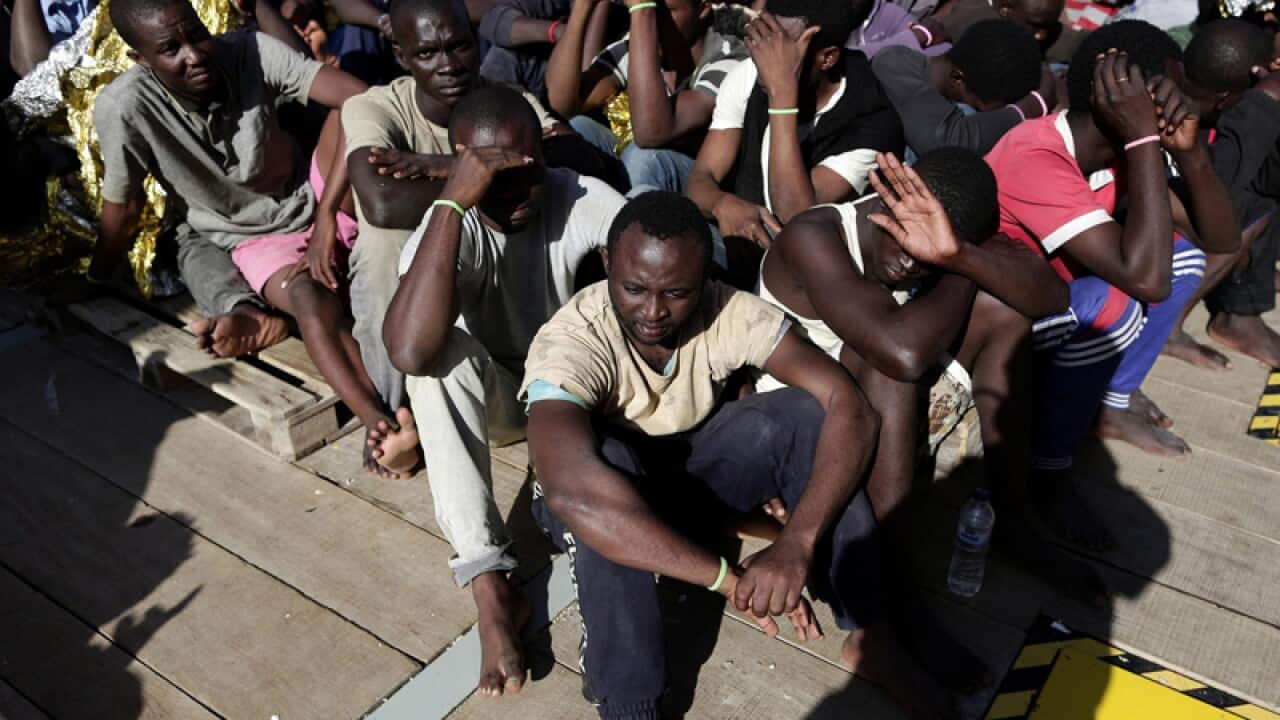The European Union has begun training the Libyan coast guard as part of efforts to curb the growing influx of irregular migrants from North Africa, EU foreign affairs head Federica Mogherini said Thursday.
"Today we are starting the training of the Libyan coast guard in Operation Sophia which is a very important step," Mogherini said as she arrived for a meeting with NATO defence ministers in Brussels.
"I think cooperation also in that respect with NATO would be important and we welcome that very much," she said.
The EU and NATO have been discussing increased overall cooperation in the face of new security challenges, such as in Ukraine and Syria.
"We are together here because a stronger Europe means a stronger NATO," alliance head Jens Stoltenberg said in opening remarks.
Stoltenberg said NATO had just launched its own Operation Sea Guardian in the Mediterranean to help support Operation Sophia.
"Today we will discuss how to deepen NATO-EU cooperation and partnership further ... including in areas of countering hybrid threats, cyber defence, exercises," he added.
The EU launched Operation Sophia last year after hundreds of migrants died when their rickety boats sank off southern Italy, sparking popular outrage at their plight.
The central Mediterranean route has seen more migrants risk their lives in recent months after the EU reached an accord with Turkey in March to halt an influx of more than a million refugees who crossed the Aegean Sea to reach Europe last year.
A separate NATO mission in the Aegean will meanwhile continue, at least until the end of the year, German Defence Minister Ursula Von der Leyen said.
Diplomatic sources said the future of this operation was uncertain given that key ally Turkey was unhappy at seeing NATO in waters so close to home and which are in some cases disputed with traditional rival Greece.
Operation Sophia is restricted to international waters in the Mediterranean so the engagement with the UN-backed administration in Libya represents an important step.
Sophia currently comprises five vessels and three helicopters charged with intercepting smugglers' boats and destroying them.
Migrant boat horror
The French aid group Doctors without Borders (MSF) said Wednesday it had found the bodies of 29 migrants who perished in a pool of fuel and seawater on a crowded dinghy off Libya.
The find adds to the grim evidence of the hazards of crossing the Mediterranean - a journey that the UN said Wednesday has claimed more than 3,800 lives so far this year, a record.
MSF said its chartered rescue ship, the Bourbon Argos, picked up 107 people aboard the inflatable boat 26 nautical miles off Libya on Tuesday.
Its crew initially counted 11 corpses on the dinghy's floor, which was flooded with a murky mixture of fuel and seawater.
The Bourbon Argos was then called away to another rescue operation nearby, saving 139 people aboard another vessel.
The crew returned to the dinghy and found on closer examination that 29 people had died, probably from suffocation, skin burns or drowning.
The bodies were retrieved from the toxic mixture over a period of hours, with the help of a team from the German NGO Sea-Watch.
"The mixture of water and fuel was so foul that we could not stay on the boat for long periods. It was horrible," MSF project leader Michele Telaro said in a statement.
'Rush to the cemetery'
Twenty-three survivors suffered burns from exposure to fuel, 11 of whom were seriously hurt. Seven survivors were taken to hospital, two of them by helicopter.
The MSF team also provided psychological help to survivors, including a man who was left clutching his eight-month-old baby after his wife died.
"It's a tragedy, but sadly one cannot say that this was an exceptional day in the Mediterranean," said Stefano Argenziano, in charge of MSF's migrant assistance activities.
"Last week was terrible for our teams. They were engaged around the clock in rescue operations in which too many men, women and children lost their lives."
To venture out to sea in such conditions, said Argenziano bluntly, "is a headlong rush to the cemetery."
In Geneva, the UN's refugee agency said fatalities on the Mediterranean migrant route had set a new, tragic record.
"We can confirm that at least 3,800 people have been reported dead or missing in the Mediterranean Sea so far this year, making the death toll in 2016 the highest ever recorded," spokesman William Spindler told AFP in an email, as the figures passed last year's mark of 3,771.
In Rome, Pope Francis pleaded on behalf of migrants and foreigners seeking a better life or safe haven abroad.
"Today, the context of economic crises unfortunately fosters the emergence of attitudes that are closed and unwelcoming," he said in his Wednesday address in St. Peter's Square.
"In some parts of the world, walls and barricades are being erected. Closure (of borders) is not a solution, it ends up by encouraging trafficking. The only path towards a solution is that of solidarity."











